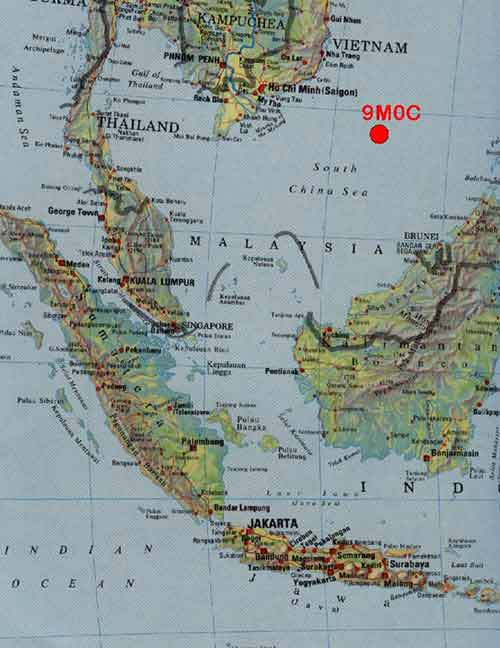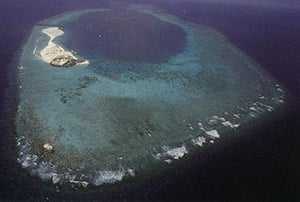
Located in the center of the South China Sea is a small, innocuous group of uninhabited island atolls named the Spratly Islands.
From first observation, this island group would be deemed worthless and uninhabitable. This observation would be grossly in error...
Exactly why is the South China Sea important?
These islands sit on the edge of the most lucrative fishing area in the South China Sea. They are also on the edge of one of the most oil- and gas-rich areas yet discovered.
And the Spratlys are claimed by no fewer than seven different countries.
"This is definitely a situation you want to watch closely," Money Morning Executive Editor Bill Patalon told readers on Dec. 8. "Any kind of a major 'incident' there will clearly have a big - and negative - impact on the world financial markets."
Here's a look at the irresistible treasures that make ownership of the South China Sea crucial...
Why Is the South China Sea Important? It's a Vital Shipping Route

The South China Sea region includes more than 200 small islands, rocks, and reefs, with the majority located in the Paracel and Spratly Island chains. Many of these islands are partially submerged islets, rocks, and reefs that are little more than shipping hazards not suitable for habitation; the total land area of the Spratly Islands is less than 3 square miles.
The islands are important, however, for strategic and political reasons. Ownership claims to them are used to bolster claims to the surrounding sea and its resources.
To that end, the region is the world's second-busiest international sea lane - more than half of the world's supertanker traffic and 30% of all global maritime trade passes through its waters. Tanker traffic through the Strait of Malacca leading into the South China Sea is more than three times greater than Suez Canal traffic, and well over five times more than the Panama Canal.

Virtually all shipping that passes through the Malacca and Sunda Straits must pass near the Spratlys. The large volume of shipping in the South China Sea/Strait of Malacca littoral has created opportunities for attacks on merchant shipping. With the exception of 2007 to 2012, when piracy in East Africa spiked, the South China Sea has been the most piracy-prone region in the world, with up to 150 attacks annually, according to the Center for International Maritime Security on Sept. 6, 2014.
Shipping (by tonnage) in the South China Sea is dominated by raw materials en route to East Asian countries. Tonnage via Malacca and the Spratly Islands is dominated by liquid bulk such as crude oil and liquefied natural gas (LNG), with dry bulk (mostly coal and iron ore) in second place. LNG shipments through the South China Sea constitute two-thirds of the world's overall LNG trade. Nearly two-thirds of the tonnage passing through the Strait of Malacca, and half of the volume passing the Spratly Islands, is crude oil from the Persian Gulf. Rising Asian oil demand could result in a doubling of these flows over the next two decades.
Additionally, the Spratly's themselves contain oil and gas resources strategically located near some of the world's largest energy-consuming countries, such as China, India, and Japan.
In its World Oil Outlook released on Dec. 23, 2015, OPEC estimated that global energy demand will increase 50% by 2040, with gas and oil expected to supply roughly 53% of energy demands.
The Asian region accounted for much of that total demand. In 2015, total global oil demand reached 94.6 million barrels per day (BPD). Nearly a third of total demand went to the Asian-Pacific and Americas regions, according to Statista.
Imports to sate Asia's growing energy needs will largely pass through the strategic Strait of Malacca into the South China Sea. As it is, over half of the world's merchant fleet (by tonnage) sails through the South China Sea every year.
Why Is the South China Sea Important? It's Oil-Rich
[mmpazkzone name="in-story" network="9794" site="307044" id="137008" type="4"]

Oil deposits have been found in most of the littoral countries of the South China Sea.
On May 11, 2015, the China Institute of International Studies (CIIS) reported estimates that the South China Sea contains approximately 11 billion barrels of oil and 190 trillion cubic feet of natural gas in proven and probable reserves.
Research also claimed the region is a potential source for hydrocarbons, particularly natural gas...
Why Is the South China Sea Important? It's Natural Gas-Rich
Though sometimes overlooked, natural gas might be the most abundant hydrocarbon resource in the South China Sea.
In fact, most of the hydrocarbon fields explored in the South China Sea regions of Brunei, Indonesia, Malaysia, Thailand, Vietnam, and the Philippines contain natural gas, not oil. Estimates by the U.S. Geological Survey (USGS) indicate that about 60% to 70% of the region's hydrocarbon resources are gas. Meanwhile, natural gas usage in the region is projected to grow by 5% per year over the next two decades - faster than any other fuel, reaching as much as 20 trillion cubic feet (Tcf) per year.
The USGS has placed the sum total of discovered reserves and undiscovered resources in the offshore basins of the South China Sea at 266 Tcf.
That surrounding areas are rich in oil and natural gas deposits has led to speculation that the Spratly Islands could be an untapped oil-bearing province located near some of the world's largest future energy-consuming countries.
Such speculation has loaded the Spratlys with great strategic value, and has fueled heated disputes over ownership. The islands have been claimed by China, Japan, Malaysia, the Philippines, Brunei, Vietnam, and Taiwan. All but Brunei occupy at least some of the region.
"Despite the growing global importance of this area - home to an estimated 1.5 billion people - the South China Sea standoff continues to get minimal coverage in mainstream U.S. news media," Patalon said. "But it won't take much to put the story on U.S. front pages."
Tweet the author @TaraKateClarke, or leave a comment on Money Morning's Facebook page.
Did Saudi Arabia Just Shoot Itself in the Foot? Low oil prices mean less revenue for OPEC's wealthiest nation - and even though Saudi Arabia has hundreds of billions in the bank, two new developments will chip away at those savings faster than ever...


